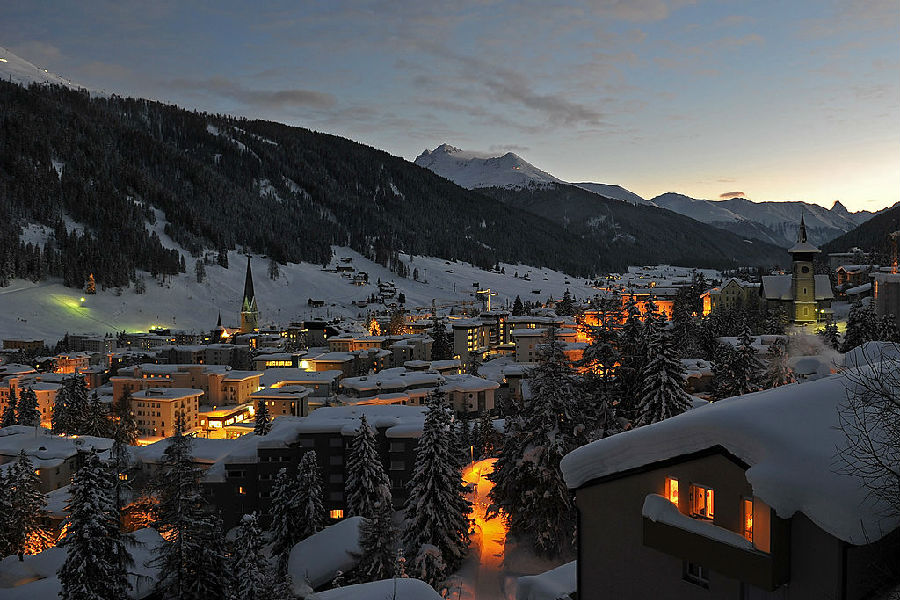(单词翻译:单击)
The $160bn Bridgewater hedge fund produced a chart last year about modern politics that was alarming for at least two reasons. First, the number crunching revealed that the proportion of votes garnered by populist, anti-establishment candidates in the west, such as US President Donald Trump, France’s Marine Le Pen and Jeremy Corbyn, leader of the UK Labour party, exploded from 7 per cent in 2010 to 35 per cent in 2017.
去年,规模为1600亿美元的对冲基金Bridgewater发布了一张有关现代政治的图表,这张图表令人震惊的原因至少有两个。首先,图中数据显示,西方民粹主义、反建制派候选人(例如美国总统唐纳德?特朗普(Donald Trump)、法国的马琳?勒庞(Marine Le Pen)以及英国工党党魁杰里米?科尔宾(Jeremy Corbyn))获得的投票比例从2010年的7%飙升至2017年的35%。
Second, the chart showed that the only time an increase of this magnitude occurred in recent memory was in the 1930s, when another financial crisis led to populism. That time, the swing prefigured the rise of nationalism and led to war. Could history repeat itself?
第二,这张图表显示,最近历史上出现过的唯一一次这么大幅度的数字飙升是在上世纪30年代,当时也是一场金融危机导致民粹主义出现。那时,这种变化预示着民族主义的崛起并导致战争。历史是否会重演?
The global elite increasingly fears so. The World Economic Forum on Wednesday released its annual survey of the main concerns of its members.
全球精英越来越担心历史再次重演。世界经济论坛(WEF)上周三公布了对其成员的主要担忧的年度调查结果。
Economic and financial risks used to be at the forefront of delegates’ minds. At the start of this decade, for example, issues such as banking crises, rising debt and slow growth topped the rankings.
经济和金融风险曾经是世界经济论坛代表们担心的首要问题。例如,在本10年之初,银行业危机、债务增加以及增长缓慢等问题排在前列。
Yet in 2018 those financial risks no longer appear on the dashboard; or certainly not close to the top. Instead, business executives, financial titans and political pundits fret about the issues that emphatically cannot be solved — or even modelled — by economists and financiers.
然而,2018年,这些金融风险不再出现在代表们的脑海里;或者肯定不会排在前面。企业高管、金融巨擘和政治专家担心的是那些经济学家和金融家断然无法解决(甚至构建模型)的问题。
WEF members fear that inequality is sparking dangerous social fractures and the populism revealed by the Bridgewater chart. They are deeply concerned about “extreme weather events”, “natural disasters” and “failure of climate change mitigation”.
世界经济论坛成员担心,不平等正引发危险的社会分裂以及Bridgewater那张图表所揭示的民粹主义。让他们深感担忧的是“极端天气事件”、“自然灾害”和“气候变化未能减缓”。
Yet the other threat cited is one that barely rated a few years ago: war. The biggest perceived danger of 2018, in terms of impact, is that somebody uses weapons of mass destruction. There is also rising concern about its digital proxy: cyber attacks.
然而,他们列出的另一项威胁在几年前几乎都没有提到:战争。他们感到2018年最大的危险(从影响来看)是有人会使用大规模杀伤性武器。越来越多的人还担心战争的数字代理:网络攻击。
Nearly all — 93 per cent — WEF members think that political and economic conflicts between countries will increase this year; 79 per cent believe there is a rising danger of military conflicts; and 78 per cent expect that large countries will be drawn into regional battles. Unsurprisingly, this leaves two-thirds of WEF delegates nursing the gloomy conclusion that the world will be riskier in 2018 than last year.
世界经济论坛几乎所有成员(93%)都认为,今年,国家之间的政治和经济冲突会增多:79%的人认为,军事冲突的风险日益增加,78%的人预测,大国将卷入地区战争。毫不令人意外的是,世界经济论坛有三分之二的代表得出悲观的结论:今年全球风险将高于去年。
It is entirely possible that this perception is wrong. One longstanding joke about the WEF, which will undoubtedly surface again at next week’s summit, is that investors should treat the Davos debate as a contra-indicator, as it usually tends to miss the important issues of the day.
这种看法完全有可能是错误的。长期以来有关世界经济论坛的一个笑话(这次峰会上肯定会再次出现)是,投资者应把达沃斯辩论视为“反指标”,因为它往往会错过当下的重要问题。
Although charts such as Bridgewater’s are fascinating, the 1930s is not the only decade that investors need to study. In the late 19th century (before electoral data could be compiled), the US also had a financial crisis that created populism; but that time it did not lead to war.
尽管Bridgewater等机构的图表很有趣,但上世纪30年代并非投资者需要研究的唯一十年。19世纪末(在选举数据可汇编之前),美国还遭遇过一场金融危机,催生了民粹主义;但那一次没有导致战争。
Even if the WEF survey is crude, it does reflect a consensus towards more conflict that is already entrenched. There is a cloud of speculation in Washington that Mr Trump is considering unilateral action against North Korea, even as Saudi Arabia sucks America into a war with Iran, and tension escalates between China and the US.
即便世界经济论坛的调查有些粗糙,但它确实反映出冲突增加的共识,这种共识已根深蒂固。华盛顿弥漫着一种猜测,认为特朗普正考虑对朝鲜发起单边行动,即便同时沙特阿拉伯正把美国拉入与伊朗的战争,同时中国与美国的紧张关系加剧。
Next week, Mr Trump will travel to Davos and, undoubtedly, will try to extend some olive branches. But he will face deep scepticism: a Gallup poll published on Thursday shows that confidence in US leadership has collapsed around the world in the past year. Fractures abound.
特朗普本周将出席达沃斯论坛,他肯定会努力递出几枝橄榄枝。但他将面临严重怀疑:上周四发表的一份盖洛普(Gallup)调查显示,过去一年全球对美国领导层的信心大幅下滑。到处是分裂。
Even if Davos can sometimes operate as an echo chamber, the WEF survey should give investors pause for thought, particularly when they look at the sky-high level of asset prices in western markets, despite low levels of volatility. It should also spur debate among investment committees and executives about whether they can create hedges to cope with this deeply fractured — and potentially dangerous — world.
即便达沃斯有时可以充当一个“回音室”,但世界经济论坛的这项调查应让投资者停下来思考,尤其是在他们目睹西方市场资产价格高企(尽管波动性低)的情况下。它还应促使投资委员会和高管们就他们能否建立对冲应对这个严重分裂(还可能危险)的世界展开辩论。

Traditionally, the answer has been “no”. Investors are bad at preparing for tail risks; war is not an environmental danger that can be modelled. But it is a fair bet that 2018 will be a year when the financial industry scrambles to offer a plethora of Armageddon hedges; indeed, the sales pitch will undoubtedly start in Davos next week.
过去,答案一直是否定的。投资者不善于为尾部风险做准备;战争并非可以建模的环境危险。但我们可以有把握地说,2018年,金融行业将争相提供大量对冲“世界末日”的产品;实际上,这些产品的销售宣传肯定将在达沃斯开始。
We should hope — and pray — that this chatter helps to focus minds among the global elite in a way that at least delays the impending apocalypse.
我们应该希望和祈祷这种辩论有助于全球精英集中思想,至少推迟已在逼近的“世界末日”的到来。
In the meantime, keep a close eye on what Davos is not worrying about enough this year: that pesky matter of global finance, particularly in places such as China.
与此同时,密切关注达沃斯今年担心不够的事情吧——也就是全球金融这个大麻烦,尤其是在中国等地。


